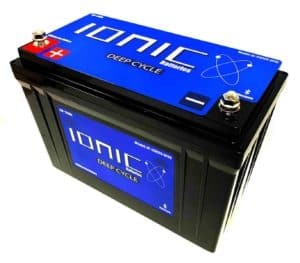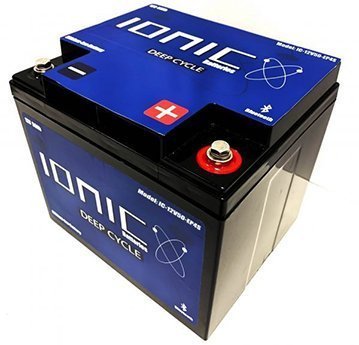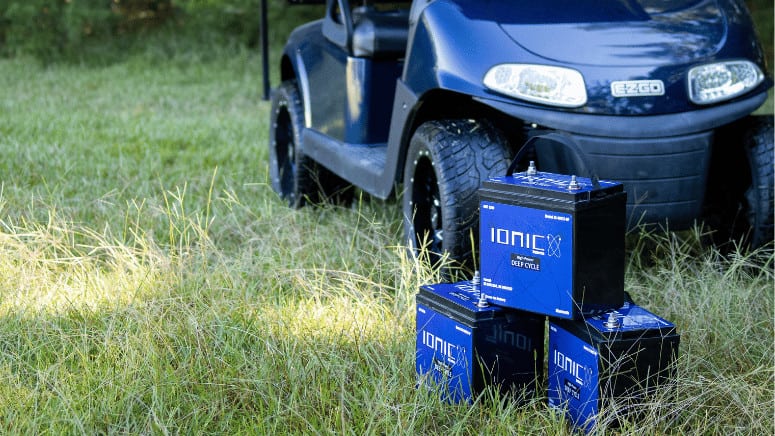Lithium and lead acid batteries are two of the most popular deep cycle battery types on the market. But which is the better choice for your boat, RV, solar setup or commercial application?
Below, you’ll find a thorough lithium vs. lead acid comparison. We’ll let you be the judge on which comes out on top.
Lithium vs. Lead Acid: A Quick Comparison
The main differences between lithium and lead acid batteries at a glance:
| LEAD ACID | IONIC LITHIUM (LiFePO4) | |
| WEIGHT COMPARISON | 100% | 50% TO 33% |
| SIZE | 100% | |
| CHARGE TIME | 6-12 HOURS | 1-5 HOURS |
| MAINTENANCE | HIGH | NONE |
| MAXIMUM USABLE CAPACITY | 50% | 85% |
| LIFESPAN (AVERAGE CYCLES) | 400 CYCLES | 5,000 CYCLES |
| LIFESPAN (AVERAGE YEARS) | 2-6 | 10-50 |
| DISCHARGE EFFICIENCY | 50-90% | 99% |
| DISCHARGE RATE WHEN NOT IN USE | 30% | 2% |
| BLUETOOTH CAPABLE | NO | YES |
| PRICE | $ | $$ |
Lithium Vs. Lead Acid: Extreme Temperature Performance
PRO TIP: Very high or very low temperatures can affect your battery’s performance. Keep that in mind when choosing your battery.
Lithium Vs. Lead Acid In Cold Temperatures
Let’s explore how lithium and lead acid batteries react to cold temperatures.
Lithium batteries hold up well in frigid conditions. But the cold affects any battery’s performance, no matter what kind. So you might notice the “juice” running out quicker. You may have to charge it more often.
Same goes for lead acid batteries. But these batteries have a much shorter lifespan than lithium. Every time you charge them, you’re chipping away at that 400-or-so cycle “bank”.
So frequent charging in the winter is going to result in earlier replacement. Lithium batteries, on the other hand, are rated to last around 3,000 to 5,000 partial cycles, so using up more cycles in winter won’t matter much.
Neither battery can be charged at extremely low temperatures. Our Ionic lithium batteries have a safety mechanism that prevents the battery from accepting a charge below 32 F.
Lithium Brings the Heat
A battery that heats itself automatically when it’s too cold to charge? Yep, that’s a thing. So go on, plan that ice fishing or snow camping trip.

SHOP 12 Volt 125Ah Lithium Deep Cycle Battery w/ Heater

SHOP 12 Volt 300Ah Lithium Deep Cycle Battery w/ Heater
Lithium Vs. Lead Acid In Hot Temperatures
It’s clear that lithium batteries beat lead acid in cold weather, but what about when it’s hot?
Because of its chemistry, lead acid is susceptible to poor performance in high temperatures. Chemical activity accelerates in the heat. The result? Reduced service life.
For every 18°F (10°C) increase from 77°F (25°C), there’s a 50% decrease in the battery’s lifespan. In other words, constant exposure to temperatures of 95 °F and above makes a lead acid battery last only half as long as it should. (Think 2 years instead of 4).
Lithium’s acid free, so heat isn’t an issue. In fact, at 131°F (55 °C) its cycle life is twice that of a lead acid battery at room temperature.
Did you know?
Ionic lithium batteries operate safely between -4 °F (-20 °C) and 140 °F (60 °C Celsius). The Optimum temperature range for maximizing its lifespan is 50 to 86 °F. (10 to 30 °C)
How Lithium Batteries Save You Money
If you could pinpoint a “downside” of lithium batteries, it would be their price. But is it really a downside? Not when you consider the fact that they save you money in the long run. Here’s how:
Greater performance.
You can’t really put a price on a better performing boat, RV, or floor sweeper. Well, actually you can, if you use your lithium batteries on the job. More battery efficiency means less downtime. Less downtime at work adds up little by little. It all adds up to greater profits.
Faster charging.
This may sound more like a time-saving mechanism. But it saves cash as well when you use your batteries for, say, a golf-cart or floor sweeper rental business. Less time charging means more time to put your machines to work.
Gasoline savings.
Loose ships may sink ships, but bulky batteries bog down boats. And a heavier vessel gulps more gasoline. Same is true for RVs and other vehicles. The savings may seem like a pittance. But they do add up over time.
Longer lifespan.
This is one battle in the lithium vs. lead acid war that has an undeniable winner. A lead acid battery’s packaging will state how long it’s rated to last. Usually it’s a measly 400 cycles or so.
Compare that to 3,000-5,000 partial cycles for lithium. Translated to years, it’s 2-6 for lead acid and at least 10 for lithium. With lithium, you’re getting a battery that lasts 5 times longer or more. But you won’t pay 5 times the price.
No maintenance.
Unlike lead acid batteries, lithium batteries don’t need to be “watered”. They also lack acid that creates corrosion (and hence, cleaning) issues. So a maintenance-free battery cuts labor costs, because employees have one less task to tackle.
Why do lithium batteries cost more?
Let’s address the elephant in the room. Why are lithium batteries more expensive? Truth is, lithium battery materials cost 3 to 4 times more than lead acid battery materials for the same battery capacity. But here’s some good news. As worldwide supply goes up, the price will no doubt come down.
Lithium Vs. Lead Acid: Further Considerations
You know that lithium batteries are lighter and more efficient than their traditional counterparts. They last longer, and hold up better in extreme temperatures. As far as cost, lead acid is the cheaper choice short-term. But cheap also means lower quality and shorter lifespan.
What else should you consider when deciding between lithium vs. lead acid?
- Environmental Impact. It’s no secret that lead is toxic. Many lead acid batteries get recycled. But others get dumped—leading to contamination of our soil, rivers, and lakes. Careless use contributes to leakage of poisonous materials in campsites, forests, and even homes.
Lithium batteries don’t present this kind of risk to our health and the environment. They’re toxin free, and don’t leak harmful chemicals.
- Bluetooth Capabilities. The technology behind lead acid batteries is 170 years old. There’s a reason why they’re so popular. They’re inexpensive to produce and buy. But there comes a time when new tech outshines the old. Lithium batteries have capabilities you can’t ignore—like Bluetooth.
With our Ionic app, you can connect your LiFePO4 battery to your phone. Pull up important stats as you need them. No more wondering how much longer you can run your trolling motor or RV house battery before recharging.
Check out our Bluetooth Guide to see how it works!
- The Peukert Effect: A lead acid battery is less efficient when you run it at a high rate of discharge. Called the Peukert effect, this phenomenon is especially apparent when you power large appliances with a lead acid battery.
Much of the battery’s energy gets wasted. So if you’ve ever wondered why your lead acid battery didn’t last as long as you thought it would after powering a large device, this is why.
The good news? Peukert’s Law doesn’t have a huge impact on lithium batteries. They discharge 99% of their stored energy. So what you put in, is what you’ll get out.
Need more info on your batteries? Read our Troubleshooting Guide. Also, How Long Do Marine Batteries Last? Find out here!



